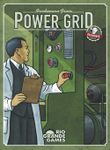- Publisher
- Rio Grande Games
- Published in
- 2004
- My Rating
- 9.0
- BGG Rating
- 7.70
- BGG Rank
- 62
- Players
- 2-6
- Ages
- 12+
- Duration
- 2:00
- Complexity
- 3.2533 / 5
- Acquired
- September 2008
- Eager to Play
- Yes
- Plays
- 11
- Last Played
- June 14, 2025
- Time Spent
- 19:10
Power Grid has players trying to power the most cities. Power plants are auctioned off each turn, and each power plant consumes some number of some type of resource to power some number of cities. Players buy power plants, "build" into cities, buy resources, and gain an income determined by the number of cities they power. The first person to "build" into at least 14 cities triggers the end game, the winner being the person who powered the most cities (money being a tie breaker).
This game has an interesting negative feedback loop: the player in the lead acts first at auctioning off a power plant (usually the worst position), and acts last at building into cities and buying resources. Resources have a sliding price, so the more that are purchased the more expensive they get. Great depth of strategy, especially in balancing your income as money is only a tie-breaker.
11 plays
- July 01, 2016
- February 18, 2016
- February 09, 2011
- August 12, 2009
- July 22, 2009
- March 11, 2009
- February 11, 2009
- January 24, 2009
- September 15, 2018
- June 14, 2025
- June 14, 2025
